Seventeen of the UK’s biggest firms have been suspended from the ‘Prompt Payment Code (PPC)’ a voluntary scheme which intends to reduce the commercial problem of late payments.
FTSE firms such as Rolls Royce, Vodafone and BHP Billiton have been ‘named-and-shamed’ by the Institute of Credit Management (ICM), the operating arm of the PPC scheme.
A business initiative formed in 2008 by the UK Department of Business Innovation and Skills, the PPC scheme aims to establish cross industry standards and adaptation of best practices in relation to the payment of smaller suppliers.
Larger enterprises that have signed up to the scheme, pledge to pay 95% of their UK suppliers within a 60-day window.
Although reprimanded by the ICM, the Seventeen companies will not be charged with any penalties.
Issuing a statement, ICM Chief Executive Philip King declared that his department had been “let down by the actions of a minority, who continue to treat supplier unfairly.”
Minister for Small Businesses Kelly Tolhurst backed the ICM’s actions, stating that it was right to expose companies of bad supplier practices –
“We remain committed to supporting small businesses against poor payment practice and are delighted to see that the Prompt Payment Code Compliance Board has acted to expose those whose payment practices fall outside of their obligations to treat suppliers fairly.”
The suspended firms, will be asked to produce action plans on how they will implement new directives to help them meet supplier payment standards.
Presenting the UK’s ‘Spring Statement’ last March, UK Chancellor Philip Hammond outlined that the government would take ‘definitive action to end the scourge of late payments on small businesses’.
Joined by FSB National Chairman, Mike Cherry, Hammond stated that as many as 50,000 UK small businesses were negatively impacted every year due to poor payment practices.
The Chancellor confirmed that the Conservative government would look to strengthen commercial laws against late payments, which were hurting UK productivity and growth.




















